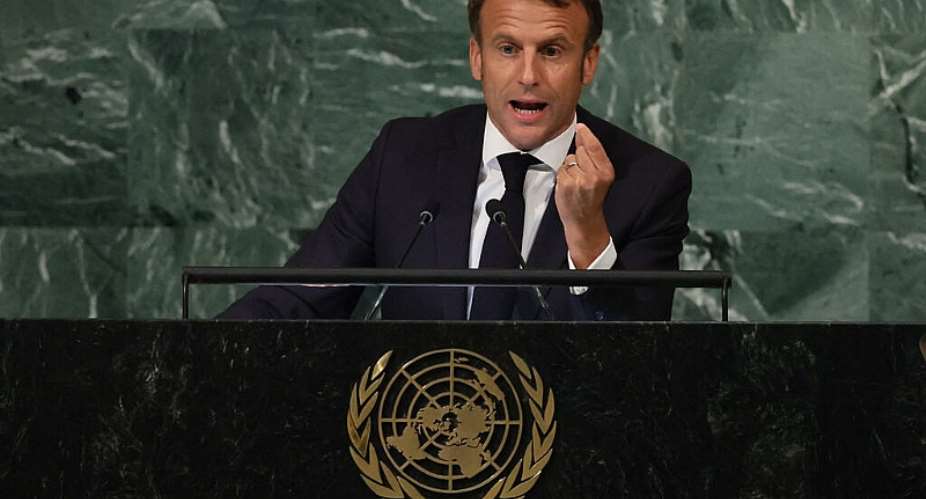French President Emmanuel Macron on Tuesday told the United Nations General Assembly in New York that Russia's invasion of Ukraine harked back to an age of colonialist imperialism.
"What we have witnessed since 24 February," the start of the Russian invasion, "is a return to the age of imperialism and colonies. France refuses this and will work persistently for peace," Macron told the UN General Assembly.
"Who is guilty of hegemony now if not Russia?" he asked.
President Macron addressed the General Assembly hours after Russian allies said they would call referendums on the annexation of occupied parts of Ukraine, a move denounced by Western powers.
European countries and the United States have imposed sanctions on Russia while a number of developing nations have sought a middle ground. Many observers fear that the Ukraine crisis is overshadowing other global concerns.
"Those who are silent now on this new imperialism, or are secretly complicit with it, show a new cynicism that is tearing down the global order without which peace is not possible," Macron said.
"It is not a matter of choosing one side between East and West, or North or South. It's a matter of responsibility" to the UN Charter, the French leader said.
"Beyond the war, there is a risk of global division as both a direct and indirect result of the conflict."
'Our world is in big trouble'
Other world leaders warned the General Assembly that the Ukraine war risked creating a new era of divisions at a time when worsening climate change and rising food prices require concerted action.
UN Secretary-General Antonio Guterres opened the summit by projecting images of a ship carrying grain out of Ukraine -- evidence that diplomacy can succeed -- as he warned of the dire state of the planet.
"Our world is in big trouble. Divides are growing deeper," Guterres said.
"A winter of global discontent is on the horizon," he added.
"Trust is crumbling, inequalities are exploding, our planet is burning. People are hurting -- with the most vulnerable suffering the most."
The Secretary-General called on developed economies to tax profits from fossil fuels and use the funds to compensate for damage from climate change and help people struggling with high prices.
"Africa has suffered enough from the burden of history," said Senegalese President Macky Sall, the current chair of the African Union, as he pleaded for a "negotiated solution" in Ukraine.
"It does not want to be the breeding ground of a new cold war."
Turkish President Recep Tayyip Erdogan, who has fashioned himself as a mediator in the Ukraine crisis, called for an end to the war that recognises Ukraine's sovereignty and territorial integrity.
"Together, we need to find a practical diplomatic solution that will give both sides a dignified way out of the crisis," Erdogan told the General Assembly.
Hungary happy with Russian human rights
In a related development, 26 EU countries on Tuesday presented a draft resolution asking the UN to appoint an expert to monitor the rights situation inside Russia. Moscow rejected the initiative as "politically biased".
Following intense discussions, all European Union countries except Hungary agreed last week to ask the UN Human Rights Council to appoint a so-called special rapporteur to investigate alleged human rights abuses inside Russia.
Blinken blames Russia for food shortage
World leaders at the United Nations on Tuesday discussed rising food insecurity, with dire warnings of a devastating shortfall next year due to the war in Ukraine.
The United States joined the European Union, African Union and Spain for a meeting at the ministerial level on food prices.
US Secretary of State Antony Blinken noted the effects of rising prices in some of the world's most vulnerable places, including Yemen, which has been devastated by eight years of war.
"As we've seen over the last years as a result of Covid, before that climate change and, more recently, conflict -- notably Russia's aggression against Ukraine -- profound food insecurity touches well over 200 million people on this planet, including, of course, in Yemen," Blinken said.
The United States has increasingly highlighted Russia's invasion of Ukraine -- a major grain producer -- as a factor in the global increase in food prices.





 Tuesday’s downpour destroys ceiling of Circuit Court '8' in Accra
Tuesday’s downpour destroys ceiling of Circuit Court '8' in Accra
 SOEs shouldn't compromise on ethical standards, accountability – Akufo-Addo
SOEs shouldn't compromise on ethical standards, accountability – Akufo-Addo
 Father of 2-year-old boy attacked by dog appeals for financial support
Father of 2-year-old boy attacked by dog appeals for financial support
 Jubilee House National Security Operative allegedly swindles businessman over sa...
Jubilee House National Security Operative allegedly swindles businessman over sa...
 Nobody can order dumsor timetable except Energy Minister – Osafo-Maafo
Nobody can order dumsor timetable except Energy Minister – Osafo-Maafo
 Mahama wishes National Chief Imam as he clock 105 years today
Mahama wishes National Chief Imam as he clock 105 years today
 J.B.Danquah Adu’s murder trial: Case adjourned to April 29
J.B.Danquah Adu’s murder trial: Case adjourned to April 29
 High Court issues arrest warrant for former MASLOC Boss
High Court issues arrest warrant for former MASLOC Boss
 Align academic curriculum with industry needs — Stanbic Bank Ghana CEO advocates
Align academic curriculum with industry needs — Stanbic Bank Ghana CEO advocates
 Election 2024: We'll declare the results and let Ghanaians know we've won - Manh...
Election 2024: We'll declare the results and let Ghanaians know we've won - Manh...
